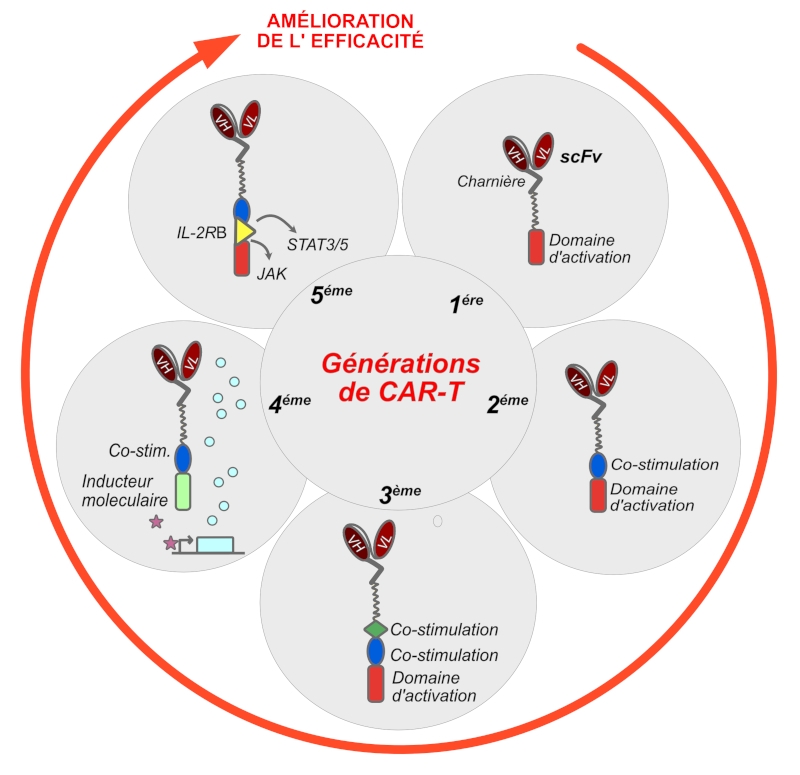| Issue |
Med Sci (Paris)
Volume 40, Number 11, Novembre 2024
|
|
|---|---|---|
| Page(s) | 848 - 857 | |
| Section | M/S Revues | |
| DOI | https://doi.org/10.1051/medsci/2024151 | |
| Published online | 10 December 2024 | |
Les nouvelles générations de cellules CAR-T
The new generations of CAR-T cells
1
Dynamics of intracellular organization laboratory, Institut Curie, PSL Research University, Sorbonne Université, CNRS, UMR144, Paris, France
2
Cell therapy Acceleration and Innovation (CellAction), Institut Curie, Suresnes, France
L’approche CAR-T, qui consiste à utiliser des lymphocytes T exprimant un récepteur de l’antigène recombinant (CAR, pour chimeric antigen receptor) permettant d’éliminer les cellules présentant un antigène particulier, est l’une des immunothérapies les plus prometteuses pour soigner les cancers. L’ingénierie des CAR-T a évolué au fil de leurs générations, pour renforcer leur activité et leur spécificité, et surmonter leurs limites, comme leur faible persistance, leur toxicité et leur inefficacité dans la lutte contre les tumeurs solides. Cette revue explore les différentes générations de CAR, les tests cliniques en cours sur le cancer et les maladies auto-immunes, ainsi que les limites associées aux cellules CAR-T dans le traitement des cancers.
Abstract
Chimeric antigen receptor (CAR)-T is one of the most promising modern cancer immunotherapies. In the recent years, impressive results have been obtained in the treatment of cancer which led to FDA approval for the treatment of liquid tumors. In this cell-based therapy, immune cells (e.g. T and NK cells) are engineered to express a synthetic receptor CAR to specifically recognize and eliminate cells expressing a target antigen.
CAR has evolved through different generations aiming to boost its biological activity and overcome limitations such as low persistence, limited potency, life-threatening toxicity and inefficient activity against solid tumor. The present review provides an overview of the different CAR generations, starting from the 1st generation with limited cytotoxic activity until the latest generation, the 5th generation or new generation, developed to overcome various limitations of CAR T therapy. The current ongoing clinical trials in cancer and autoimmune diseases, and the limitation associated with CAR-T cells in cancer therapy, are also discussed.
© 2024 médecine/sciences – Inserm
 Article publié sous les conditions définies par la licence Creative Commons Attribution License CC-BY (http://creativecommons.org/licenses/by/4.0), qui autorise sans restrictions l’utilisation, la diffusion, et la reproduction sur quelque support que ce soit, sous réserve de citation correcte de la publication originale.
Article publié sous les conditions définies par la licence Creative Commons Attribution License CC-BY (http://creativecommons.org/licenses/by/4.0), qui autorise sans restrictions l’utilisation, la diffusion, et la reproduction sur quelque support que ce soit, sous réserve de citation correcte de la publication originale.
Current usage metrics show cumulative count of Article Views (full-text article views including HTML views, PDF and ePub downloads, according to the available data) and Abstracts Views on Vision4Press platform.
Data correspond to usage on the plateform after 2015. The current usage metrics is available 48-96 hours after online publication and is updated daily on week days.
Initial download of the metrics may take a while.





